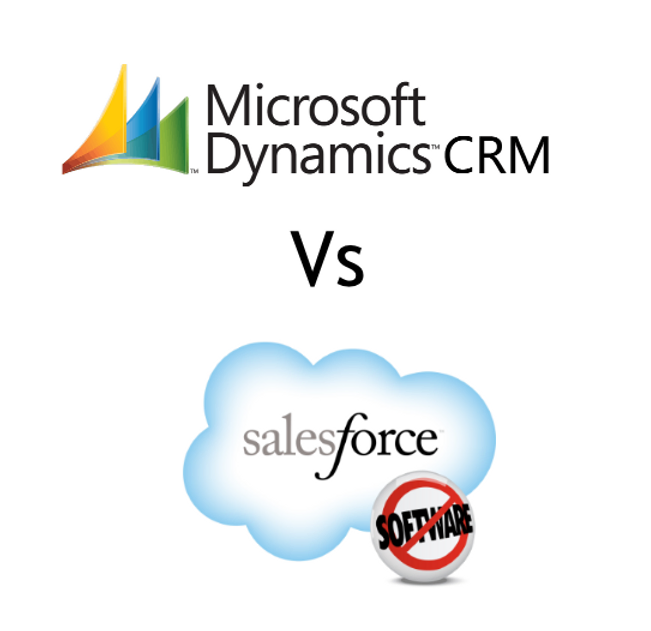Salesforce.com VS Dynamics CRM, Which Provides the Biggest Bang For Your Buck?

Choosing the right CRM software for your business can seem like a daunting decision. That’s why I decided it was time to write a post that compared two of the heavy hitters in this industry, Microsoft Dynamics CRM and Salesforce.com. Below you will see listed a few of the characteristics that are most important to consider when making this type of decision and a description of how each solution meets that criteria.
Pricing – Microsoft Dynamics CRM online offers full functionality for $34 per user per month.** On premise partner solutions will of course be more expensive, but offer increased flexibility for those organizations that need the best of the best in a powerful, customized solution. Salesforce.com starts at $125 per user per month * for functionality comparable to Dynamics CRM online. Buyers should beware of hidden charges and note that the company’s lower-priced offerings do not offer full functionality.
Data ownership – When you work with a Microsoft partner and choose the Dynamics CRM on premise option you have complete ownership over your own data and its security. With Salesforce.com you lose some of that control, your data is hosted in a third party’s data centers located throughout the world.
Service level agreement – Microsoft Dynamics CRM online is committed to a financially backed guarantee of 99.9% uptime. Salesforce.com offers no such agreement.
Easy access to the content you and your people need – Microsoft Dynamics CRM online provides organizations with 5 GB of storage, allowing you to store a great deal of your data within the product itself. Furthermore, Dynamics CRM online integrates seamlessly with Microsoft SharePoint, making it a snap to leverage the investment you’ve already made in that system. Salesforce.com on the other hand, only allows organizations to store 1 GB of data at a time and does not offer out-of-the-box integration with SharePoint.
Quotes, Orders and Invoices – As all business owners know, their organization’s functions are inexorably linked to one another. Therefore, CRM cannot take place in a vacuum. Instead, that information needs to be easily transferable among many different business processes. To accommodate this fact, Microsoft Dynamics CRM automates the production of quotes, orders and invoices. The data used to create these deliverables can be manually entered into the system or synced with your ERP system by using an integration tool such as Scribe or the Connector for Microsoft Dynamics. This allows sales information to be automatically shared between Microsoft Dynamics CRM and your ERP system, thereby reducing the likelihood of human error. Salesforce.com however, does not offer customers the option for this type of integration. Instead, its users must build their invoicing and quote processes from the ground up, which not only makes the CRM system more expensive and time-consuming to get up and running, but also may leave the customer with a set of disjointed processes.
Off-line usability – Dynamics CRM gives users the option to access their data off-line through Microsoft Outlook and to keep a local copy of that data on their own computers. That way, your team can access the data they need even when they are not connected to the Internet. Only with its more premium plans does Salesforce.com give users offline access to some of their data. The least expensive of which is approximately twice the cost of a Dynamics CRM online subscription. User-friendly interface – Microsoft Dynamics CRM looks like and performs seamlessly with the Microsoft Office software you and your people are already accustomed to using. And, it is a well-known fact that when a software system looks familiar and does not force users to completely rethink the way they work the probability that adoption will occur is greatly increased. Salesforce.com does offer an Outlook add-on that is meant to sync your data between the two systems. However, it is only able to automatically update some information, meaning that your people will be left spending valuable time and effort copying and pasting the data that cannot be synced.
And, in case these reasons have not yet convinced you that Microsoft Dynamics CRM is the best option for your business, consider this: it has been reported that Microsoft spent an estimated $9.5 billion on research and development in 2010,making it the biggest R&D spender in the world. Microsoft is committed to continually upgrading and improving its products and developing solutions that work for business.
So, if you like what you’ve read and want to learn more about Microsoft Dynamics CRM, contact us today! We can help you choose and implement systems that will work for your business today and in the future. By: Laura Heinbockel Intelligent Technologies, Inc., a Greensboro, NC Microsoft Dynamics Partner * Salesforce.com Enterprise Edition (priced at $125/user/month) offers comparable CRM functionality to Microsoft Dynamics CRM Online ** Dynamics CRM $34/user/month promotional price is valid through June 30, 2011, $44/user/month otherwise.
About Dynamica Labs
Dynamica Labs is one of the oldest Dynamics CRM Partners and one of a very few companies with ISO 9001 Quality Management System certification for Dynamics CRM project delivery services.
For over 15 years we have been focused on 3 key CRM project goals: delivering measurable business results, following a cost-effective approach, providing the highest quality standards. Over the course of these years, we’ve taken part in hundreds of projects from SMEs to blue-chip global companies.
